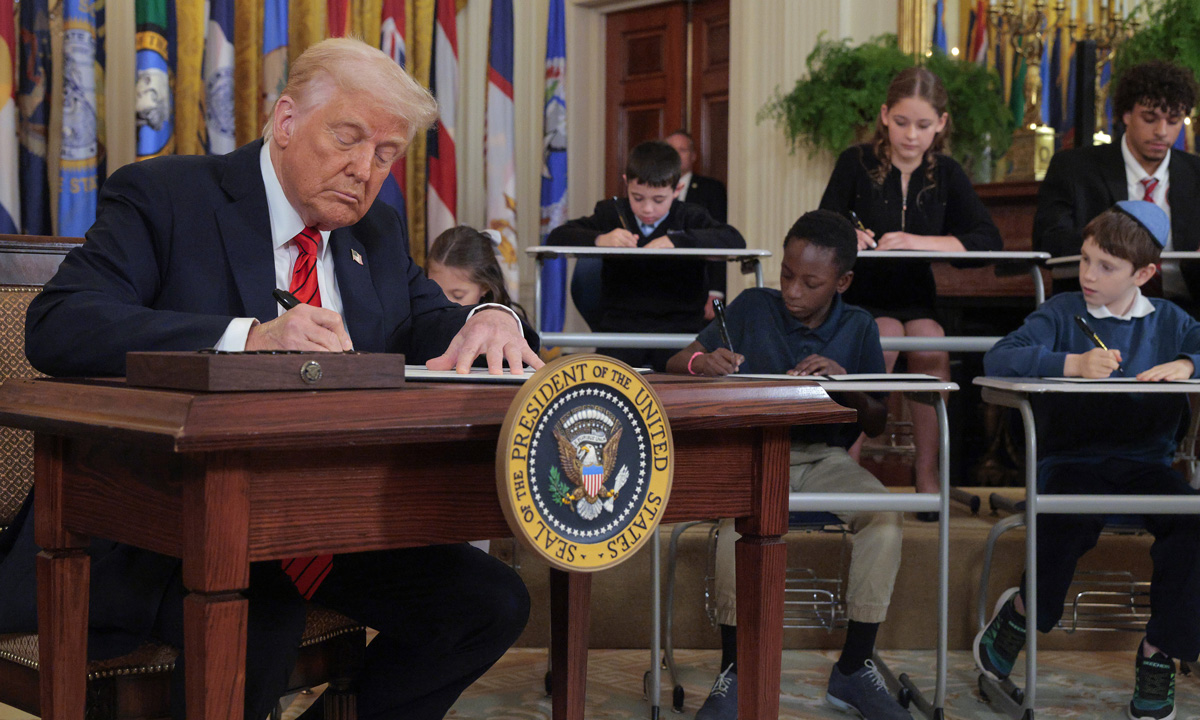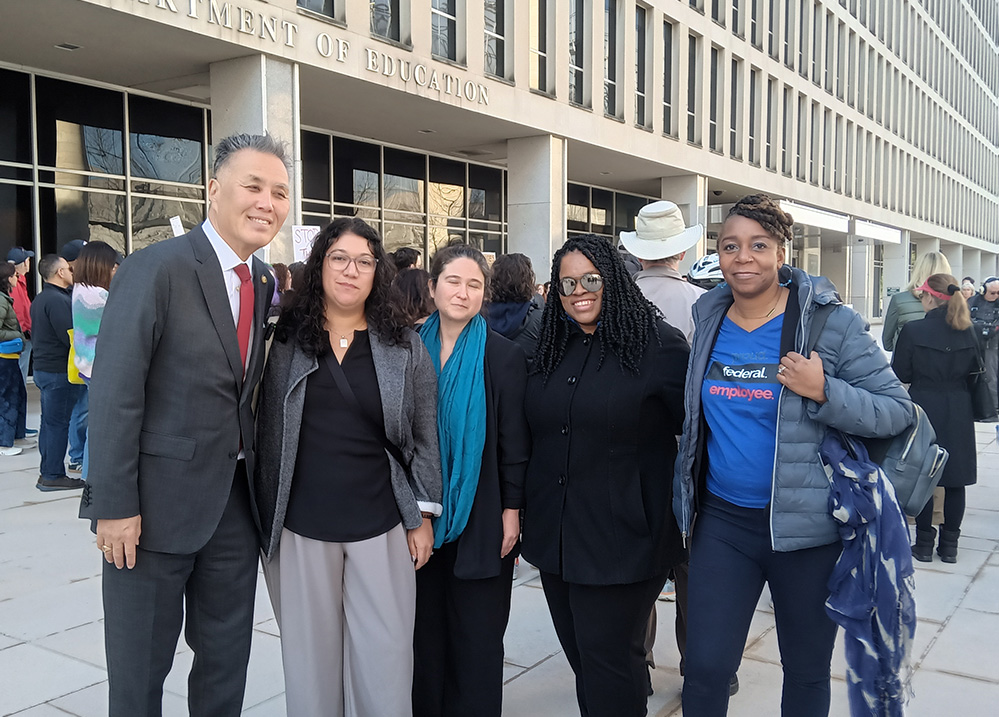Get stories like this delivered straight to your inbox. Sign up for The 74 Newsletter
In a televised interview this weekend, Education Secretary Linda McMahon told CNN’s Dana Bash, “It’s unacceptable where education is in our country today.” Citing poor test scores, she made clear her plan: shutter the department she heads, in compliance with President Donald Trump’s March 20 executive order.
“I’m not quite sure how eliminating the Department of Education is going to make those test scores go up,” Bash pushed back, before asking the secretary for a guarantee that students with disabilities would be protected, even without the oversight of a federal education agency.
Throughout the exchange, McMahon — who in a recent Fox interview struggled to define the Individuals with Disabilities Education Act — remained firm that all students would be better served once the department was dismantled and programs re-allocated to other agencies.
But many former and current department employees feel differently. They claim the past two months have been marked by a recklessness that not only upended their lives and careers, but will ultimately inflict the greatest harm on America’s most vulnerable students.
Three of them spoke with The 74 to share their stories. Each was dedicated to education before landing at the department, working in a range of environments, including classrooms, foster care, afterschool programming and advocacy organizations for people with disabilities. Despite the recent tumult, all three women hope to be reinstated and return to the work they love, though the prospect of that happening anytime soon seems to be receding.
While the Education Department cannot officially be abolished without Congress’s unlikely approval and separate lawsuits were filed this week to stop its demise by the nation’s two largest teachers unions, the N.A.A.C.P. and others, the agency has already been dramatically weakened by Trump.
On March 11, McMahon cut the staff by almost half. These mass firings came a little over a month after at least 55 Education Department employees were put on administrative leave, pursuant to Trump’s anti-DEI executive order, and at least 65 probationary employees — those who had recently been hired or promoted — were fired.
“My hope would always be that I could go back,” one of the women now on leave told The 74. “I didn’t see myself retiring ever.”
‘The uncertainty of the next day’
Kissy, who asked to be identified by her first name only for fear of retaliation from the Trump administration, transitioned into government work after 12 years of teaching in New York and the Washington, D.C., area. She ultimately left that job, she said, because she was frustrated by the restrictions placed on her teaching approach and increasingly plagued by the physical symptoms of multiple sclerosis.
“If I can’t stand in a classroom, I can at least make sure that the classroom is there and functioning,” she said of her decision to bring her skills to the department.

As an education program specialist in the Office of Postsecondary Education, Kissy focused on grants, including those assigned through what’s known as the Hispanic-Serving Institutions Division, which looks to strengthen higher education opportunities for Hispanic students and other underrepresented groups. She was one of dozens placed on paid leave in January “pursuant to the President’s executive order on DEIA [Diversity Equity Inclusion and Accessibility].”
“It’s painful,” she said. The impact this will have on schools and students “makes the pit of my stomach just fall.”
Kissy and others in her position have since come together to try and understand why they were targeted. She emphasized that while her work did center on supporting institutions with large Hispanic student populations, the grants ultimately served all students, regardless of ethnicity. After connecting with others, the only common thread they could find was a sensitivity training course they were strongly encouraged to take — some during Trump’s first term.
She’s particularly frustrated that the decision was explicitly not in response to any wrongdoing: “That hurts even more, because I can’t even say I can take accountability, that I did something wrong. You just feel picked on — picked on by a bully that you have no problem standing up to, but they can’t even tell you why.”
Kissy agrees that there were systems in the department that needed to be changed and updated, but she feels the thoughtless axing of thousands of positions was done without true regard for efficiency or the well-being of America’s education system.
Beyond feeling passion for her work, Kissy said she also needs the job she’s held since 2016 for the health insurance benefits so she can treat her MS and a newly diagnosed case of colon cancer. On administrative leave, she still receives pay and benefits, but knows those could disappear at a moment’s notice.
“It’s just the uncertainty of the next day, of the next hour that is very frustrating as an individual,” she said. “And it’s painful to have people think that what you’re doing doesn’t matter.”
‘The sky is really falling’
Denise Joseph began working at the Education Department almost a decade ago, after spending 25 years in various other education roles.

“My goal was to work at all these wonderful places, learn as much as I can about education and then go to the federal government as a culminating experience: the final step of my career,” Joseph said.
In her role as a management and program analyst in the Office of Postsecondary Education, she did onboarding, offboarding, exit interviews and staff training. She supported managers and supervisors to help them more efficiently execute their grant portfolios, she said, and served in a number of volunteer positions, including staff mentoring and peer-to-peer learning.

For these, she said she received the highest performance review possible: “Exceptional.” Her goal was to build what she called a “culture of care” within the department.
That plan was derailed by an email she received at 7:58 p.m. on Jan. 29. The letter, which she initially thought was spam, told her she’d been placed on administrative leave.
The announcement was marked by confusion — her direct supervisor was “blindsided” and “didn’t know what was going on,” she said.
“Everyone’s crushed,” she added. “I can’t do the work that I really want to do that was making a difference in my community and the nation.”
She’s spent the time since in limbo, writing to over 50 members of Congress, attending rallies, reaching out to organizations and just generally “sounding the alarm.”
“The sky is really falling,” Joseph said.
A few weeks later, she was one of the thousands who were officially laid off via email, when her department and position were both abolished as part of the March 11 purge. All this was apparently a prelude to Trump’s March 20 executive order, meant to disband the department in its entirety.
“We knew it was coming,” she said. “I feel better that it’s finally out there so people can file their lawsuits.”
But she fears what will happen to students if the department’s accountability measures disappear: “If that oversight is gone — especially minority students, students that are economically disadvantaged, students with disabilities, students with really any special circumstances that are not handled and that can’t be managed in a general classroom — those students will get left behind. Not only left behind, but they won’t have the adequate services to help them reach their career and educational goals.”
Joseph has been able to celebrate one victory: On March 5, she completed her doctorate in education policy and leadership studies at the University of Maryland. The moment was bittersweet, she said, since she had pursued this big step in her own educational path in the hopes of bettering herself and the department.
But she hasn’t given up yet.
“Some people think it’s a done deal,” she said. “Some people, like me, are still fighting.”
‘It’s gone into the abyss’
Victoria DeLano’s professional work as an investigator at the Office for Civil Rights was also deeply personal.
In July 2024, just before she began working for OCR, the classical piccoloist and flutist and former college music educator said she filed her own federal discrimination complaint against the University of Alabama Tuscaloosa, charging that it refused to provide web accessibility accommodations she needed for her visual disability.
After spending over a decade as a disability and patients’ rights advocate, including as a senior case worker and investigator for the Alabama Disabilities Advocacy Program, DeLano started her new role at the Education Department in December.

“It was amazing. It was a dream,” she said. “It was every person prioritizing every minute to do a great job, focused on the citizens of this country.”
She said she was shocked and devastated when she was one of dozens of Education Department probationary employees who were fired without notice in mid-February.
She had been at the department for less than two months when she said she was locked out of her computer and work email account. She didn’t receive an official termination letter until almost a week later, she said, and only because she “begged” for one. A month later, she still hadn’t been informed of any official offboarding process nor has she received the paperwork necessary to file for unemployment.
The whiplash was swift in mid-March when a Maryland court temporarily blocked the sweeping firings of thousands of probationary workers across the federal government, leading to DeLano’s rehiring, followed by an almost immediate notification that she was put on administrative leave. As she awaited her fate at the Education Department, she said she was also up for an investigator role at the Justice Department — only to see Trump cut that position as well.
Despite McMahon’s assertions that the discrimination cases of terminated employees will be transferred to their remaining colleagues, DeLano fears for the kids her office was meant to protect. Because fired OCR staffers lost access to their emails and their files, she said they couldn’t transfer that information to other investigators.
“It’s gone into the abyss,” DeLano added. “So we’re looking at [thousands of] cases that are just going to be stalled because they took a sledgehammer to this, with zero plan to transition any of those cases to other investigators.”
There were some 12,000 pending OCR cases when Trump took office. DeLano knows that backlog is about to take on a different meaning: her own disabilities-related complaint is still open, she said, and the investigator working on it was terminated.
Get stories like these delivered straight to your inbox. Sign up for The 74 Newsletter








